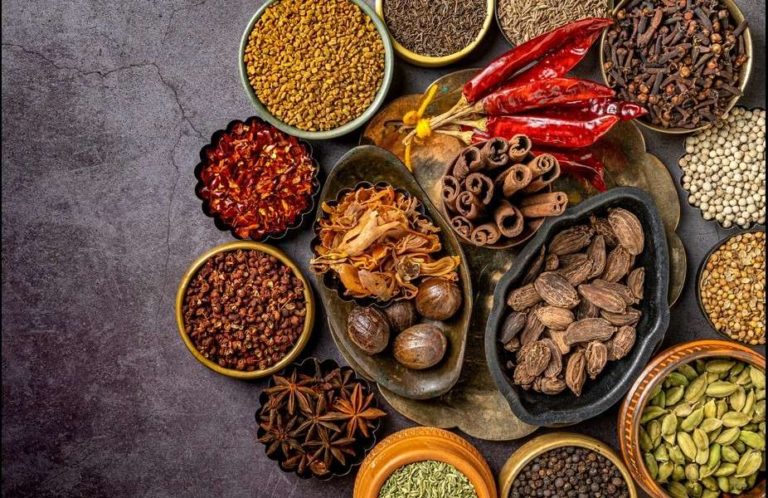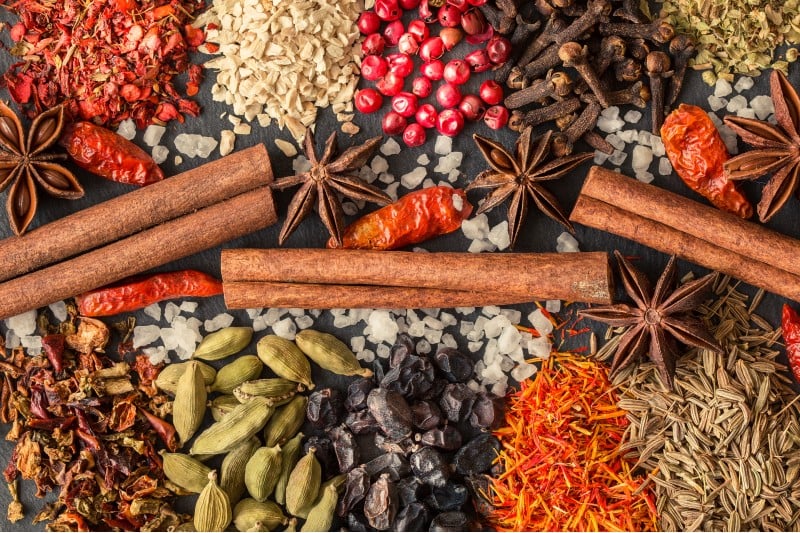- Health
- Updated on September 4, 2025
Traditional Indian Spices and Their Health Benefits

Indian cuisine is celebrated worldwide not just for its flavors but also for the extensive use of traditional spices. These spices, cultivated for centuries, are more than just culinary essentials—they offer a wide range of health benefits. Incorporating them into your daily diet can boost immunity, improve digestion, and even enhance mental health.
Why Indian Spices Are Special
Indian spices are unique because they combine taste with medicinal properties. Unlike many seasonings used purely for flavor, Indian spices often carry bioactive compounds that support overall well-being. For instance, turmeric contains curcumin, known for its anti-inflammatory and antioxidant properties. Regular use of these spices can help prevent chronic diseases and support holistic health.

Turmeric: The Golden Spice
Turmeric is perhaps the most renowned Indian spice globally. Its bright yellow color and earthy flavor make it a staple in Indian kitchens.
Health Benefits of Turmeric
Turmeric’s active compound, curcumin, has strong anti-inflammatory and antioxidant properties. It may help reduce the risk of heart disease, support joint health, and enhance brain function. Additionally, turmeric can improve digestion and support liver detoxification.
Using turmeric in curries, soups, or even warm milk can be a simple way to enjoy its health benefits. Many wellness enthusiasts also combine it with black pepper to increase absorption.
Cumin: The Digestive Aid
Cumin, with its warm and nutty flavor, is another essential spice in Indian cooking. It is widely used in curries, rice dishes, and lentils.
Health Benefits of Cumin
Cumin is rich in iron and may aid digestion by stimulating the secretion of digestive enzymes. It can help reduce bloating, improve gut health, and support metabolism. Additionally, cumin has antioxidant properties that help fight free radicals in the body. A simple way to incorporate cumin is by sprinkling roasted cumin seeds over salads or adding them to your daily cooking.
Coriander: Cooling and Nutritious
Coriander, also known as dhaniya, is used in both seed and leaf form in Indian cuisine. Its fresh leaves add a bright flavor, while seeds bring a warm, citrusy note to dishes.
Health Benefits of Coriander
Coriander seeds and leaves are known for their digestive and anti-inflammatory properties. They may help lower blood sugar levels, improve heart health, and detoxify the body. Coriander is also a natural diuretic and can support kidney function. Adding coriander leaves to salads or soups is an easy way to enjoy its benefits.
Cardamom: The Aromatic Wonder
Cardamom, or elaichi, is a fragrant spice commonly used in Indian sweets, teas, and curries. Its sweet, aromatic flavor makes it versatile for both savory and sweet dishes.
Health Benefits of Cardamom
Cardamom supports digestion, helps combat bad breath, and may have antibacterial properties. It can improve respiratory health, aid in detoxification, and boost metabolism. Cardamom tea or adding crushed pods to desserts can make it easy to include this spice in your diet.
Cinnamon: Sweet and Heart-Friendly
Cinnamon, or dalchini, is often associated with desserts and beverages but is widely used in Indian spice blends.
Health Benefits of Cinnamon
Cinnamon is rich in antioxidants and may help regulate blood sugar levels. It can reduce inflammation, support heart health, and enhance cognitive function. Sprinkling cinnamon on oatmeal, yogurt, or coffee is a simple way to reap its health benefits daily.
Cloves: Small but Mighty
Cloves, known as laung in Hindi, are tiny but packed with a potent flavor. They are used in biryanis, masalas, and teas.
Health Benefits of Cloves
Cloves have antimicrobial and antioxidant properties. They can help relieve toothaches, improve digestion, and support liver health. Clove tea or adding a few cloves to cooking can bring both flavor and wellness to your meals.
Fenugreek: The Nutritional Powerhouse
Fenugreek, or methi, is a versatile spice used as seeds, leaves, and powder. It is a key ingredient in many Indian curries and pickles.
Health Benefits of Fenugreek
Fenugreek seeds are known to help regulate blood sugar, improve digestion, and boost milk production in nursing mothers. They also support heart health by reducing cholesterol levels. Sprouting fenugreek seeds or using fenugreek powder in cooking can make it easy to enjoy its health benefits.
Mustard Seeds: The Tangy Kick
Mustard seeds, or rai, add a sharp, tangy flavor to Indian dishes, especially pickles and stir-fries.
Health Benefits of Mustard Seeds
Mustard seeds contain selenium, magnesium, and omega-3 fatty acids. They support heart health, reduce inflammation, and may help with muscle pain. Simply tempering mustard seeds in oil before adding them to curries can maximize their nutritional benefits.
How to Incorporate Indian Spices Into Your Diet
To enjoy the health benefits of these spices, you don’t need complicated recipes. Here are some simple ways to include them in your daily routine:
- Spice Blends: Create your own spice mixes for curries, soups, and rice dishes.
- Teas: Add spices like turmeric, cardamom, cinnamon, or cloves to hot beverages.
- Roasted Seeds: Cumin, fenugreek, and mustard seeds can be lightly roasted and sprinkled over meals.
- Smoothies & Desserts: Cinnamon and cardamom can add flavor and health benefits to smoothies, desserts, and yogurts.
By incorporating a variety of Indian spices into your daily diet, you not only enhance the flavor of your meals but also boost your overall health naturally.
Read Also : Best Street Foods in India: A Culinary Journey Through the Streets
Conclusion
Traditional Indian spices are a treasure trove of health benefits. From turmeric and cumin to cardamom and cinnamon, these spices offer powerful antioxidants, anti-inflammatory compounds, and digestive support. They are versatile, easy to use, and can transform everyday meals into wellness-promoting dishes.
Embracing these spices in your daily routine can help improve digestion, boost immunity, support heart and liver health, and even enhance mental well-being. So, the next time you cook, remember that these aromatic ingredients are more than just flavor—they are nature’s way of keeping you healthy.
Join the discussion
Related Articles
No results available
ResetTrending Articles


- General
- Updated on February 10, 2026


- General
- Updated on February 7, 2026


- General
- Updated on February 5, 2026


- General
- Updated on February 2, 2026


- General
- Updated on January 29, 2026


- General
- Updated on January 24, 2026


- General
- Updated on January 28, 2026


- General
- Updated on January 28, 2026


- General
- Updated on January 21, 2026


- Health
- Updated on January 20, 2026
No results available
Reset


